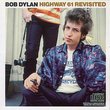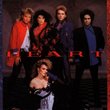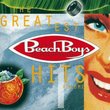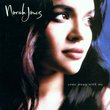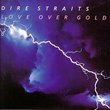| All Artists: Jethro Tull Title: This Was Members Wishing: 7 Total Copies: 0 Label: Capitol Release Date: 1/8/2002 Album Type: Original recording remastered, Original recording reissued, Extra tracks Genres: Pop, Rock, Classic Rock, Metal Styles: Blues Rock, Progressive, Progressive Rock, Album-Oriented Rock (AOR) Number of Discs: 1 SwapaCD Credits: 1 UPCs: 724353545925, 766487953122 |
Search - Jethro Tull :: This Was
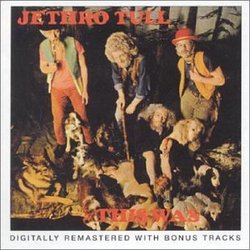 | Jethro Tull This Was Genres: Pop, Rock, Classic Rock, Metal
Digitally remastered reissue of 1968 album includes three bonus tracks, 'One For John Gee', 'Love Story' & 'Christmas Song'. |
Larger Image |
CD DetailsSynopsis
Album Description Digitally remastered reissue of 1968 album includes three bonus tracks, 'One For John Gee', 'Love Story' & 'Christmas Song'. Similar CDsSimilarly Requested CDs
|
CD ReviewsYes, it was John S. Ryan | Silver Lake, OH | 01/05/2003 (5 out of 5 stars) "As Ian Anderson intended to convey by the title of this album, "this was" the sort of music Tull were making in 1968.Having reshuffled a few times (and changed names a few times, too) from the "John Evan Band," Tull at this time consisted of Ian Anderson, guitarist Mick Abrahams (later of Blodwyn Pig), bassist Glenn Cornick (who remained with the band through _Stand Up_ and _Benefit_), and drummer/percussionist Clive Bunker (who stuck around through _Aqualung_). Anderson, who to this day describes himself as a frustrated guitarist, had recently switched to the flute, an instrument on which he figured (correctly) Clapton wasn't likely to outclass him anytime soon. (He had also invented a wee beastie called the "claghorn," a flutelike instrument with a mouthpiece like a saxophone. Jeffrey Hammond made it, and Anderson plays it on "Dharma for One".)People who know only the later Tull may be surprised by this album. It's mostly blues; Anderson swaps off on harmonica and shares both vocals and cowriting credits with Abrahams (a fine blues guitarist who wrote "Move On Alone" by himself and is credited with the arrangement of the traditional "Cat's Squirrel"). There's also a cover of Roland Kirk's "Serenade to a Cuckoo" (which Anderson says is the first song he ever learned to play on the flute) and the aforementioned "Dharma for One" (a live version of which appeared on _Living in the Past_ a few years later). Most famous, perhaps, is "A Song for Jeffrey," since a song involving Jeffrey Hammond appeared on each of the first three Tull LPs. (Hammond wasn't yet a member of the band; he replaced Cornick as of _Aqualung_.)Good stuff, at any rate, and this recent remastering is well done. The bonus tracks are good too -- a short "tribute" piece (by Abrahams) to John Gee (manager of the Marquee Club), plus two songs that longtime Tull listeners will recognize from _Living in the Past_. The sound quality is excellent throughout.As of _Stand Up_, Anderson started moving away from blues-based material and toward the stuff we now know as classic Tull. After this album was released, Abrahams departed and was replaced (briefly) by Tony Iommi (later of Black Sabbath), then (permanently, thank God) by Martin Barre. As of _Benefit_, Anderson's writing had taken a darker and somewhat more cynical turn, John Evan had (re)joined them, and Barre had begun to establish his own guitar style. After that, of course, were _Aqualung_ and history.But _This Was_ isn't just a glimpse at the beginnings of a great band; it's also in its own right a successful album of British blues. Add it to your Tull collection if it's not there already." A Quintessential Debut Album Bud | Seminole, Texas, USA | 08/17/2004 (5 out of 5 stars) "Some debut albums obviously suggest what's going to come from a band, while others don't (this doesn't make them any better or worse than the other). Pink Floyd's debut "The Piper At the Gates of Dawn" contained little if nothing at all that suggested this was the band that would later record the scathing "Animals" and "The Wall." The Who's first album "My Generation" was full of cheeky insolence but it certainly didn't give a preview to such great works as "Quadrophenia." Then again, other debuts make their mark and reveal exactly what a band or artist will sound like at their peak; Led Zeppelin's self-titled debut had enough heavy metal crunch to affirm that they would become the ultimate arena vikings of the 70s; Bruce Springsteen's "Greetings From Asbury Park N.J." was an obvious pointer at the anthems-for-the-downtrodden-blue-collar-class that made him famous. And then there's Jethro Tull's auspicious first round "This Was." At the time, there had rarely been such gutsy performances from a group making their debut, even in the progressive rock scene. Prog pioneers King Crimson's "In the Court of the Crimson King" was still a short while away, and "This Was" was a landmark recording that gave definite clues as to the uncharted territories that the progressive movements would take listeners to, despite the fact that Tull was obviously heavy into blues roots. But the interpretations of blues and jazz influences here are brave and often challenging, with such standout cuts as `Serenade to a Cuckoo,' `Someday the Sun Won't Shine For You,' and the bizarre, unintelligible `A Song For Jeffrey.' Ian Anderson was asserting himself as an intriguing frontman, and the contributions of the line-up of Mick Abrahams, Clive Bunker, and Glenn Cornick defined this particular era of Jethro Tull, even if they weren't as worldly successful as the next line-ups. "This Was" is a fascinating debut album, full of promise and originality from a band dabbling heavily in blues and jazz roots while giving the music a brand new sound at the same time. " Up for a debate? Ask Tull fans about This Was Graboidz | Westminster, Maryland | 05/27/2004 (4 out of 5 stars) "When I first discovered Jethro Tull about 20 years ago, I began to buy anything and everything I could get my hands on that the band put out. But I always heard two things regarding Tull, buy "Passion Play" but only after you have developed a serious ear for Tull, and "This Was" was not really a Tull album because it sounded so different from everything else they have done. On "Passion Play" I would agree, I wouldn't make getting that disk a priority, but I have to say "This Was" was a pleasant surprise. I enjoyed this debut album even if it was slightly different from the rest of Tull catalog. But there are some true Tull classics here, "My Sunday Feeling" and "Song for Jeffrey" are still played in concert today by the current Tull line up. Mick's bluesy guitar work is phenominal, (If you haven't picked up Bloodwyn Pig's A Head Rings Out CD Do So!) and culminates in the fantastic, rocking "Cat's Squirrel" instrumental. Ian Anderson plays a really mean flute on "This Was" as well. Overall, I would say if you are a fan of Tull you have to own "This Was" if for no other reason than to hear how the band sounded at it's beginning. "This Was" is a great foundation for one of the best bands of all time."
|

 Track Listings (13) - Disc #1
Track Listings (13) - Disc #1

